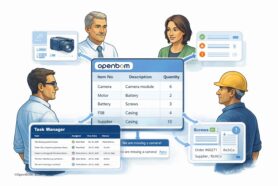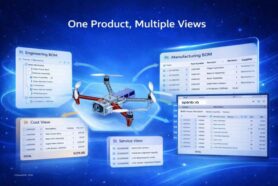
Manufacturing is a complex teamwork. It requires a lot of interaction with different types of software and communication with people responsible for various aspects of product lifecycle management. This is what we call the engineering and manufacturing environment. And it impacts our lives both professionally and personally. The places where we spend our lives have an impact on how we feel and it has an impact on how we work. Clunky environments impact our work and influence our professional mission.
Having a comfortable environment is important. Engineers and everyone else in a business won’t like using software that is not fit for the work they need to do. Imagine asking engineers to work with software that is not built for their jobs. Think about the many people you see every day in different businesses. It is no surprise, good software is like a good tool. You won’t be doing good work without good tools.
What is true for many organizations is that there is someone different when it comes to engineering and manufacturing data management software. Complex PDM/PLM tools developed 20+ years ago are still around and used mostly by large companies, but all (small and large) companies reluctantly rely on Excel and Spreadsheets to manage data, communicate and collaborate.
My attention was caught by G2’s report “State of Software Happiness Survey“. According to a survey made by G2, more than 95% of respondents stated that they would be more satisfied at work with access to better software. The software stack should be an extension of your design, engineering, and manufacturing team. It should be designed to help them accomplish their tasks with the same level of care and attention to detail as your employees. Companies that don’t invest in these types of tools aren’t investing in their people.
Here is my favorite passage:
Imagine getting your news by word of mouth or – gasp – a newspaper. Go back to processing your printed receipts with your desk calculator and ledger. Try thinking about how you’d manage all your data without spreadsheets and pivot tables, or collaborating on a presentation without access to the cloud. How about running a marketing campaign and getting no data to prove ROI, or sending a press release and manually tracking media placement.
This is a life without software. It’s a life without instant communication. Without automation. Without dashboards or analytics or reporting.
Fortunately, this isn’t the world we live in. Despite the distractions of social media and a lightning-fast news cycle, we’re more productive and making more data-driven decisions than ever before. Software touches everything we do, particularly at work.
Here is my favorite picture from the survey.
The thing that we constantly hear from OpenBOM prospects and customers is that engineering and manufacturing companies are lacking good tools to manage data, collaborate and communicate. As a result, Excel is the best PLM tool engineers and manufacturing teams have in their hands.
At OpenBOM we are focusing on how to help engineers and manufacturing teams to collaborate and work together by focusing on the core of the processes – data management and collaboration. These are three things that we do at OpenBOM to keep a tough balance between why engineers like Excel and the reason why the same engineers hate Excel.
- Flexible data model
- Ease of editing
- Data sharing and collaboration
Focusing on these three aspects of OpenBOM user experience and data management we help manufacturing companies to keep the simplicity and, at the same time deliver data management features that are completely lacking in any spreadsheet environment.
- Single source of truth (no data duplication)
- Product Structure, rollups, and calculation
- Granular revision control.
Conclusion:
Better software can make your employees happier and help them do their job more efficiently. While many manufacturing companies consider engineering data management, BOM management, and communication as a “black box”, in fact, it can be a place where bad data quality and employee unhappiness impact your business processes.
REGISTER FOR FREE and try our 14-Day trial to see how OpenBOM can help you today.
Best, Oleg
Join our newsletter to receive a weekly portion of news, articles, and tips about OpenBOM and our community.










